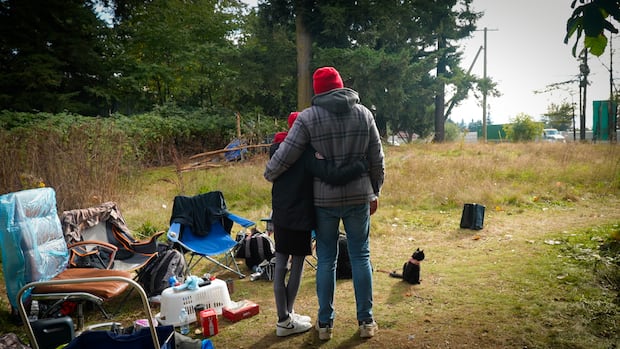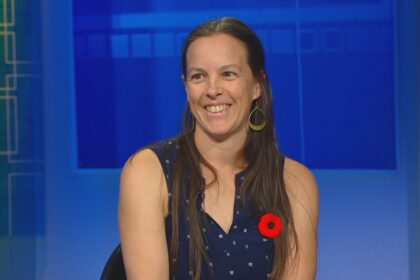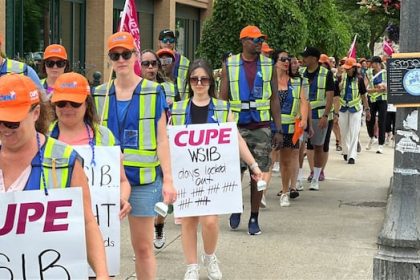British ColumbiaIn Abbotsford, a new point-in-time count shows the number of people who are homeless continues to grow. Advocates say concerns are growing amid the closure of a large temporary shelter, and worries about the colder months ahead. City has 654 people experiencing homelessness, according to latest count, but only 210 active shelter bedsBaneet Braich · CBC News · Posted: Oct 27, 2025 9:00 AM EDT | Last Updated: 5 hours agoListen to this articleEstimated 5 minutesA new homeless count in Abbotsford reflects a rise of homelessness and more accurate data collection methods, according to the city. (Baneet Braich/CBC)Beneath the wet branches of a large tree, Emilie Massicotte and her partner have finished organizing a shopping cart filled with his belongings, including a folded tent, clothing and a sunflower-shaped post for their two kittens. While Massicotte has access to supportive housing, she says it’s been difficult to find a place that accepts both her and her partner in Abbotsford, B.C., about 60 kilometres east of Vancouver.“You lose everything in your life. [It] is very disappointing, the system doesn’t help people enough to survive,” she said. Massicotte still spends much of her time outdoors with her partner and close friends who are among a growing number of people facing homelessness in the Fraser Valley. This month, the homeless point-in-time count identified 654 people experiencing homelessness in Abbotsford, compared to 465 in 2024. With more people sleeping rough, advocates and those facing homelessness say supports such as shelter beds and housing are not keeping pace with demand. Those concerns are mounting amid the recent closure of one of Abbotsford’s largest shelters, and with cold, wet months ahead.As of Oct. 20, there are 210 active shelter beds in Abbotsford, according to B.C. Housing. “It’s a crisis. And we are not doing a good enough job of supporting people to move out of homelessness as quickly as possible,” said Brittany Alenius, executive director of Matsqui-Abbotsford Impact Society. WATCH | Homelessness rising in Abbotsford:Homelessness is rising in Abbotsford, B.C. — and advocates say housing isn’t keeping upIn Abbotsford, a new point-in-time count shows the number of people who are homeless is continuing to grow. Advocates say they’re especially concerned after the closure of a large temporary shelter in the Fraser Valley community, and they worry about the colder months ahead. The City of Abbotsford and advocates note the point-in-time count done on Oct. 1 reflects both a rise in homelessness and more accurate data collection. Several changes to federal guidelines for the enumeration process meant individuals were included even if they declined to complete a survey, removing a key limitation of past counts. Outreach teams were also able to visit more locations across the city.“We’ve done a better job of capturing the true number, although it is still an undercount,” said count co-ordinator and Sparrow Community Care Society executive director Jesse Wegenast.50-bed temporary shelter shuttersThe count, advocates say, underscores the urgency for more shelter beds and housing solutions, especially with the city now losing a key facility.Since Oct. 20, the temporary 50-bed Lonzo Road shelter has been closed to begin construction for the Highway 1 corridor work.The land, owned by the B.C. Transportation Financing Authority, was licensed to B.C. Housing for the shelter. It was built after a controversial encampment was dismantled in 2023.B.C. Housing says the 50-bed temporary shelter on Lonzo Road, pictured on Oct. 23, has been closed to allow for work regarding Highway 1 construction. (Baneet Braich/CBC)“We always knew that these shelter spaces were temporary. However, it is a major blow,” said Wegenast. While B.C. Housing said all guests at the Lonzo shelter have already been offered relocation to other shelters in Abbotsford, advocates say the closure still has rippling consequences. “It is still a zero-sum game because for every person from that closing shelter that’s gone into an existing bed, that’s prevented that shelter from taking in someone new,” said Wegenast.Abbotsford Mayor Ross Siemens said he is in discussion with the province to figure out where the shelter could be relocated. B.C. Housing said it is also working on plans with the City of Abbotsford and community partners to deliver over 240 new beds and supportive homes in Abbotsford in the next few years. Need for more accessible supports Back at their spot, Massicotte hugs her partner as their two kittens play in the the grass beside them. Massicotte says she hopes to see more housing solutions for couples and pet owners soon.She says a key challenge outdoors is the rain and cold, since bylaw requires her partner and friends to pack up their tents by 9 a.m. each morning. They also avoid shelters to live more on their own terms. “We don’t like shelters,” she said.Emilie Massicotte, pictured in Abbotsford on Oct. 16, hopes future housing can better support the distinct needs of people facing homelessness, such as options for couples and pets. (Baneet Braich/CBC)Alenius said it’s a sentiment others facing homelessness can relate to because some shelters are unable to cater to complex needs, leaving them with empty beds at times. She said that includes some shelters not offering harm reduction supplies and safe spaces for people to use substances, or having strict curfews and rigid rules.“These people are used to governing their own lives,” said Alenius. “We really need to do a better job of meeting people where they’re at … so that people can move on to tiered services that help climb out of homelessness.”In a statement, B.C. Housing said the vast majority of shelters in Abbotsford operate with a harm reduction and recovery focus to support people. Brittany Alenius, executive director of Matsqui-Abbotsford Impact society, says beds sometimes sit empty because shelters are unable to meet the distinct needs of those facing homelessness. (Baneet Braich/CBC)Siemens acknowledged homelessness is a complex issue the community can’t solve on its own. “The barrier, I think, for getting people in is we all have to live by rules. If there’s certain rules that people don’t want to live by, but that [are] in place so that people can live in those shelters, that’s on them.” But he stresses the rise in homelessness highlights the need for more resources and stronger support from higher levels of government.“I need governments to understand their role, their funding mechanism, but they need to listen and to act on what information that we have,” Siemens said.He said the city has prioritized researching the distinct challenges homeless people are facing and continues to look for solutions such as the need for more detox beds in the Fraser Valley. “Housing people is one thing, keeping them housed is another,” Siemens said. ABOUT THE AUTHORBaneet Braich is a journalist with CBC News. Connect with her at baneet.braich@cbc.ca or on Twitter at @Baneet_BraichBaneet_Braich
As homelessness rises in Abbotsford, advocates say housing and resources not keeping pace











